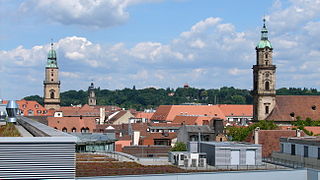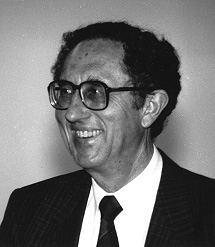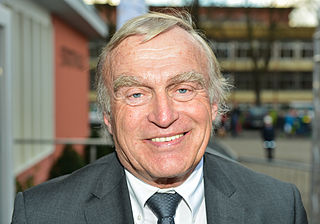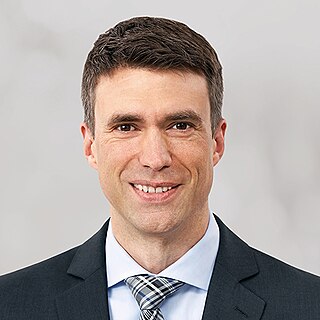
Nuremberg is the second-largest city of the German state of Bavaria after its capital Munich, and its 518,370 (2019) inhabitants make it the 14th-largest city in Germany. On the Pegnitz River and the Rhine–Main–Danube Canal, it lies in the Bavarian administrative region of Middle Franconia, and is the largest city and the unofficial capital of Franconia. Nuremberg forms with the neighbouring cities of Fürth, Erlangen and Schwabach a continuous conurbation with a total population of 800,376 (2019), which is the heart of the urban area region with around 1.4 million inhabitants, while the larger Nuremberg Metropolitan Region has approximately 3.6 million inhabitants. The city lies about 170 kilometres (110 mi) north of Munich. It is the largest city in the East Franconian dialect area.

Georg Simon Ohm was a German physicist and mathematician. As a school teacher, Ohm began his research with the new electrochemical cell, invented by Italian scientist Alessandro Volta. Using equipment of his own creation, Ohm found that there is a direct proportionality between the potential difference (voltage) applied across a conductor and the resultant electric current. This relation is called Ohm's law, and the ohm, the unit of electrical resistance, is named after him.

Erlangen, is a Middle Franconian city in Bavaria, Germany. It is the seat of the administrative district Erlangen-Höchstadt, and with 116,062 inhabitants, it is the smallest of the eight major cities in Bavaria. The number of inhabitants exceeded the threshold of 100,000 in 1974, making Erlangen a major city according to the statistical definition officially used in Germany.

Gottlieb Christoph Adolf von Harless, was a German Lutheran theologian.

University of Erlangen–Nuremberg is a public research university in the cities of Erlangen and Nuremberg in Bavaria, Germany. The name Friedrich–Alexander comes from the university's first founder Friedrich, Margrave of Brandenburg-Bayreuth, and its benefactor Alexander, Margrave of Brandenburg-Ansbach.

Günther Beckstein is a German CSU politician from Bavaria and was the 17th Minister President of Bavaria from 9 October 2007 to 27 October 2008. He is well known for his outspoken views on law and order.

The Max Planck Institute for the Science of Light (MPL) performs basic research in optical metrology, optical communication, new optical materials, plasmonics and nanophotonics and optical applications in biology and medicine. It is part of the Max Planck Society and was founded on January 1, 2009 in Erlangen near Nuremberg. The institute is based on the Max Planck Research Group "Optics, Information and Photonics", which was founded in 2004 at the University of Erlangen-Nuremberg, as a precursor. The institute currently comprises four divisions.

Heinz Bauer was a German mathematician.
Wilfried Paul Feldenkirchen was a German professor and economic historian.
Friedrich Heckmann is the director of the research institute European Forum for Migration Studies and emeritus professor of sociology at the School of Social and Economic Sciences at the University of Bamberg. His main research, teaching and consulting interests focus on migration and social integration. Heckmann contributed significantly to the institutionalisation of migration and integration research in Germany through the launch of the research committee Migration and Ethnic Minorities (1985) within the German Sociological Society and the co-founding of the European Forum for Migration Studies in 1993 as one of the first research institutes on migration and integration in Germany. Moreover, he established migration studies in the sociology department of the University of Bamberg.

Helmut Haussmann is a German academic and politician. He served as minister of economy from 1988 to 1991.

The Nuremberg Metropolitan Region comprises 3.5 million people on 21,800 square kilometers. With a gross domestic product of 134 billion euros and about 1.9 million employees, this metropolitan area is one of the strongest economic areas in Germany. The major cities are Nuremberg, Fürth, Erlangen, Bayreuth and Bamberg.
Friedrich Wilhelm Karl, Ritter von Hegel was a German historian and son of the philosopher Georg Wilhelm Friedrich Hegel. During his lifetime he was a well-known and well-reputed historian who received many awards and honours. He was one of the major urban historians during the second half of the 19th century.

Simone Warzel is a German mathematical physicist at the Technical University of Munich. Her research involves statistical mechanics and the many-body problem in quantum mechanics. She is a co-author of the book Random Operators: Disorder Effects on Quantum Spectra and Dynamics.

Martin Johannes Sichert is a German merchant and politician (AfD). He has been a member for his party in the 19th Bundestag and since 25 November 2017 its Bavarian state chairman. Sichert was born in Nuremberg, and completed his studies as a business graduate at the University of Erlangen-Nuremberg in 2006. He worked in Regensburg for more than seven years. At the beginning of the millennium he was a member of the Young Liberals. Martin Sichert has been chairman of the AfD district association Nuremberg / Schwabach and was 2017 direct candidate in the constituency Nuremberg North. From 2017 to 2019 he was State Chairman of the AfD Bayern.

Stefan Müller is a German politician of the Christian Social Union (CSU) has been serving as a member of the Bundestag from the state of Bavaria since 2002.
Helmut Neuhaus is a German historian who specialises on the Early modern period. From 1989 to 2009 he held the Chair of Modern History I at the University of Erlangen–Nuremberg.
Horst Weigelt is a German Protestant theologian. From 1975 to 2002 he was Professor of Historical and Systematic Theology at the Otto Friedrich University of Bamberg. His research focuses on the Reformation, Pietism and Enlightenment in the early modern period. He has also written specifically on Schwenkfelders.
Johannes Wagner is a German physician and politician of Alliance 90/The Greens who has been serving as a member of the Bundestag since 2021.
Jonas Geissler is a German politician of the Christian Social Union (CSU) who has been serving as a member of the Bundestag since 2021.












